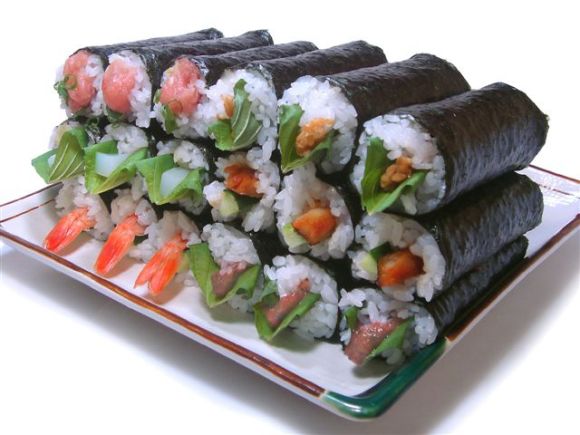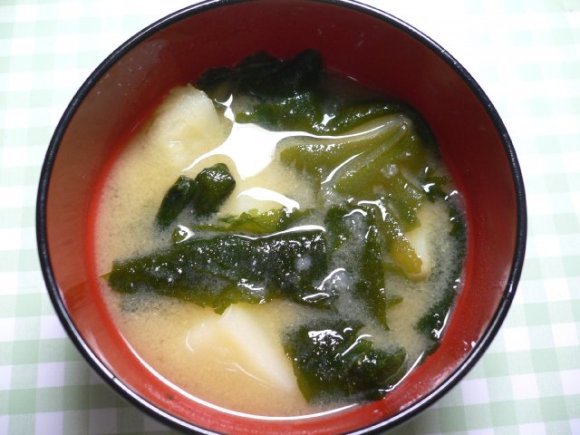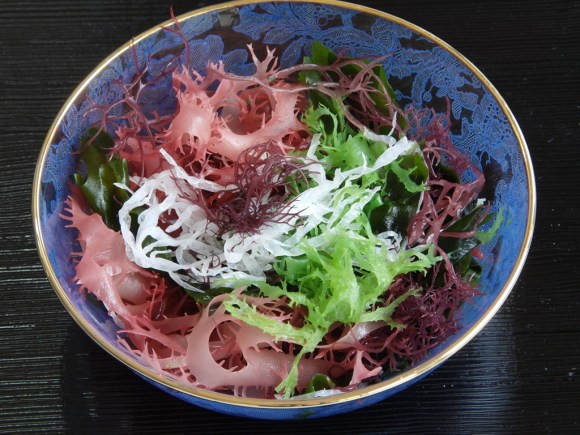
Ask a Westerner what their favorite Japanese food is and there’s a high chance that the answer will be sushi. The widespread popularity of the delicately crafted delicacy has made it almost synonymous with the word “Japan”, even though there now exist dozens of different varieties made by people from all over the world.
Many of you reading this will have had sushi, some of you might even love it more than your mom’s cooking, but even so, that doesn’t guarantee that you have the guts for sushi. We’re not talking about the courage needed to put raw fish in your mouth, but rather, the genes required to properly digest seaweed.
Confused? Here’s the science behind it.
Three years ago, Mirjam Czjzek, a chemist at the Station Biologique de Roscoff in France, discovered that Japanese people have a type of bacterium known as Bacteroides plebeius in their guts, which contains an enzyme that helps them break down the carbohydrates in seaweed. Testing a group of 13 Japanese and 18 North Americans showed positive results in five of the Japanese subjects, but none of the North Americans appeared to have the seaweed-munching enzyme in them. The Westerners are not the odd ones here, however, as the enzyme is commonly found only in marine bacteria.
Before you start thinking Japanese people are secretly mutants, let’s make it clear that they didn’t genetically modify themselves in some crazy science experiment. It is speculated that their intestinal bacteria might have gotten friendly with the seaweed-digesting enzymes found in bacteria that live on seaweed itself. The Japanese have a long history of handling the marine algae raw, as an ancient form of currency as well as part of their daily diet up till today. Such day-to-day contact with seaweed apparently gives the human gut bacteria a chance to merge with genetic material from the seaweed-chomping bacteria.
▼ Wakame, a type of green seaweed, is often served in miso soup.
▼ Seaweed salad containing assorted varieties of edible seaweed.
But not to worry, you’re not going to get a case of tummy ache from ingesting seaweed even if your body doesn’t posses some of that algae-digesting bacterium. Neither are the Japanese people who have yet to gain such super powers. What the enzyme does is “help Japanese who dine on seaweed get more nutrition from their meal than do North Americans”, Czjzek explains. So it’s offers a helping hand rather than being an essential addition to our bodies.
Oh well, so our non-Japanese bodies may absorb fewer nutrients from seaweed, but at least we don’t have to give up on eating sushi just because our guts aren’t tailored for digesting marine algae!
Well, that’s the long story cut short. If you’re interested the scientific details behind the research, be sure to check out the full article!
Source: Science AAAS
Images: Shinjuku Takashimaya Blog, Inoue Isamu Shouten, Recipe Box



 How to have a great meal at conveyer belt sushi chain Kura Sushi even if you hate raw fish
How to have a great meal at conveyer belt sushi chain Kura Sushi even if you hate raw fish Seven reasons to eat sushi (other than because it tastes great)
Seven reasons to eat sushi (other than because it tastes great) Towering piles of sushi are waiting for you at this awesome Tokyo restaurant 【Photos】
Towering piles of sushi are waiting for you at this awesome Tokyo restaurant 【Photos】 Do you really know how to eat sushi? Probably not!
Do you really know how to eat sushi? Probably not! Tokyo has a BLUE sushi restaurant with all-you-can-eat BLUE sushi for just 400 yen (US$3.50)
Tokyo has a BLUE sushi restaurant with all-you-can-eat BLUE sushi for just 400 yen (US$3.50) Yakuzen ramen restaurant in Tokyo is very different to a yakuza ramen restaurant
Yakuzen ramen restaurant in Tokyo is very different to a yakuza ramen restaurant Tokyo Skytree turns pink for the cherry blossom season
Tokyo Skytree turns pink for the cherry blossom season Adorable Totoro acorn key holders come with a special guest hidden inside[Photos]
Adorable Totoro acorn key holders come with a special guest hidden inside[Photos] Starbucks Japan adds new sakura Frappuccino and cherry blossom drinks to the menu
Starbucks Japan adds new sakura Frappuccino and cherry blossom drinks to the menu Japan’s first-ever capybara cat cafe opens in Tokyo
Japan’s first-ever capybara cat cafe opens in Tokyo Anna Sui’s new manga accessory collection includes anime eye pouches and torso bags
Anna Sui’s new manga accessory collection includes anime eye pouches and torso bags Man arrested in Japan after leaving car in coin parking lot for six years, racking up three-million-yen bill
Man arrested in Japan after leaving car in coin parking lot for six years, racking up three-million-yen bill Osaka establishes first designated smoking area in Dotonbori canal district to fight “overtourism”
Osaka establishes first designated smoking area in Dotonbori canal district to fight “overtourism” Senkoji: The Japanese temple that’s more like a theme park to heaven and hell
Senkoji: The Japanese temple that’s more like a theme park to heaven and hell Save yourself hundreds of yen at CoCo Ichibanya curry chain through menu mastery!
Save yourself hundreds of yen at CoCo Ichibanya curry chain through menu mastery! The 10 most annoying things foreign tourists do on Japanese trains, according to locals
The 10 most annoying things foreign tourists do on Japanese trains, according to locals Starbucks Japan releases new sakura goods and drinkware for cherry blossom season 2026
Starbucks Japan releases new sakura goods and drinkware for cherry blossom season 2026 Naruto and Converse team up for new line of shinobi sneakers[Photos]
Naruto and Converse team up for new line of shinobi sneakers[Photos] Is Sapporio’s Snow Festival awesome enough to be worth visiting even if you hate the snow? [Pics]
Is Sapporio’s Snow Festival awesome enough to be worth visiting even if you hate the snow? [Pics] Japan has trams that say “sorry” while they ride around town…but why?
Japan has trams that say “sorry” while they ride around town…but why? Sakura Totoro is here to get spring started early with adorable pouches and plushies
Sakura Totoro is here to get spring started early with adorable pouches and plushies Starbucks Japan unveils new sakura Frappuccino for cherry blossom season 2026
Starbucks Japan unveils new sakura Frappuccino for cherry blossom season 2026 Poop is in full bloom at the Unko Museums for cherry blossom season
Poop is in full bloom at the Unko Museums for cherry blossom season Now is the time to visit one of Tokyo’s best off-the-beaten-path plum blossom gardens
Now is the time to visit one of Tokyo’s best off-the-beaten-path plum blossom gardens Playing Switch 2 games with just one hand is possible thanks to Japanese peripheral maker
Playing Switch 2 games with just one hand is possible thanks to Japanese peripheral maker Japan’s newest Shinkansen has no seats…or passengers [Video]
Japan’s newest Shinkansen has no seats…or passengers [Video] Foreigners accounting for over 80 percent of off-course skiers needing rescue in Japan’s Hokkaido
Foreigners accounting for over 80 percent of off-course skiers needing rescue in Japan’s Hokkaido Super-salty pizza sends six kids to the hospital in Japan, linguistics blamed
Super-salty pizza sends six kids to the hospital in Japan, linguistics blamed Foreign tourists in Japan will get free Shinkansen tickets to promote regional tourism
Foreign tourists in Japan will get free Shinkansen tickets to promote regional tourism Take a trip to Japan’s Dododo Land, the most irritating place on Earth
Take a trip to Japan’s Dododo Land, the most irritating place on Earth Archfiend Hello Kitty appears as Sanrio launches new team-up with Yu-Gi-Oh【Pics】
Archfiend Hello Kitty appears as Sanrio launches new team-up with Yu-Gi-Oh【Pics】 Survey asks foreign tourists what bothered them in Japan, more than half gave same answer
Survey asks foreign tourists what bothered them in Japan, more than half gave same answer Japan’s human washing machines will go on sale to general public, demos to be held in Tokyo
Japan’s human washing machines will go on sale to general public, demos to be held in Tokyo Starbucks Japan releases new drinkware and goods for Valentine’s Day
Starbucks Japan releases new drinkware and goods for Valentine’s Day We deeply regret going into this tunnel on our walk in the mountains of Japan
We deeply regret going into this tunnel on our walk in the mountains of Japan Studio Ghibli releases Kodama forest spirits from Princess Mononoke to light up your home
Studio Ghibli releases Kodama forest spirits from Princess Mononoke to light up your home Major Japanese hotel chain says reservations via overseas booking sites may not be valid
Major Japanese hotel chain says reservations via overseas booking sites may not be valid Put sesame oil in your coffee? Japanese maker says it’s the best way to start your day【Taste test】
Put sesame oil in your coffee? Japanese maker says it’s the best way to start your day【Taste test】 No more using real katana for tourism activities, Japan’s National Police Agency says
No more using real katana for tourism activities, Japan’s National Police Agency says You can now get fugu, Japan’s poisonous blowfish, for under a buck at revolving sushi restaurants
You can now get fugu, Japan’s poisonous blowfish, for under a buck at revolving sushi restaurants Why settle for a sushi bowl, when this restaurant will give you a sushi mountain?
Why settle for a sushi bowl, when this restaurant will give you a sushi mountain? Who’s got the best, cheapest one-person sushi delivery in downtown Tokyo? Mr. Sato investigates!
Who’s got the best, cheapest one-person sushi delivery in downtown Tokyo? Mr. Sato investigates!